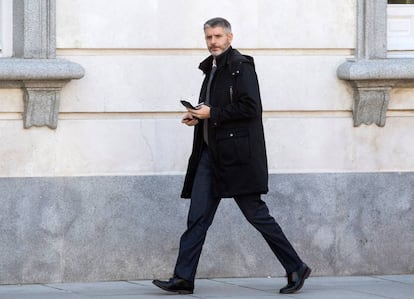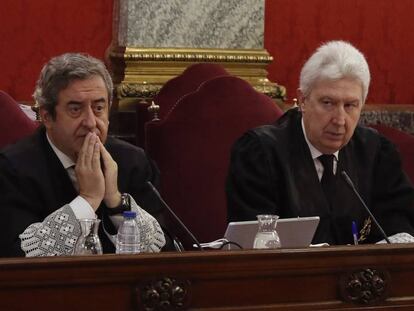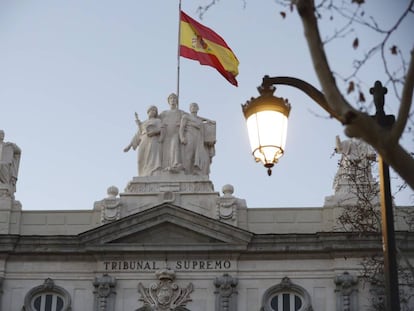Former Catalan deputy premier in court: ¡°I am a political prisoner¡±
Oriol Junqueras, who is on trial for his role in the pro-independence drive, has refused to answer the public prosecutor¡¯s questions, and denies having committed any offenses

The first defendant to take the stand at the trial of Catalan separatist leaders in Madrid has refused to answer prosecutors¡¯ questions, casting himself as ¡°a political prisoner.¡±
Oriol Junqueras, a former deputy premier of Catalonia and head of the Catalan Republican Left (ERC) party, is one of 12 people accused of crimes in connection with the unauthorized independence referendum of October 1, 2017 and the unilateral independence declaration that followed, despite warnings from the courts that this would violate the Constitution.
Nobody could ever doubt that we have always rejected all forms of violence
Oriol Junqueras, ex-deputy premier of Catalonia
The proceedings are taking place at the Supreme Court in Madrid, where the case is being closely followed in Spain and abroad. The independence movement has sought to cast doubt on the impartiality of the Spanish justice system, and Prime Minister Pedro S¨¢nchez recently traveled to Strasbourg to meet with EU officials and insist that the defendants will get a fair trial.
Junqueras, who is facing charges of rebellion and misuse of public funds that could entail 25 years in prison, only took questions from his defense attorney, Andreu Van den Eynde, and used his statements to craft a narrative that portrayed his own case as politically motivated.

¡°From my point of view none of the things we did were crimes. Not voting in a referendum, not working toward the independence of Catalonia. Nothing, absolutely nothing,¡± said Junqueras, who has been in pre-trial detention since late 2017. His boss at the time, then-Catalan premier Carles Puigdemont, fled to Belgium shortly after the unilateral declaration to avoid arrest.
Junqueras said that the right to self-determination is encoded in ¡°numerous¡± international treaties, and that the independence bid was the Catalan government¡¯s response to the will of a majority of Catalans.
A deliberate plan?
During one of their searches on September 20, 2017, Civil Guard officers found a document entitled ¡°Enfocats¡± at the office of Josep Maria Jov¨¦, who was then a top aide to Junqueras at the regional finance department. This document is one of the main pieces of evidence against the defendants, as it says that achieving independence will require ¡°actions¡± leading to ¡°a democratic conflict with broad citizen support, aimed at generating political and economic instability to force the [Spanish] State to accept a negotiation about secession or a forced referendum.¡±
Around two-fifths of voters participated in the October 1, 2017 referendum, as most opponents of secession stayed home in protest over a poll that had been declared unconstitutional. According to the Catalan government, 90% of participants voted to secede, which authorities construed as a mandate to push ahead with independence.
In response, Madrid triggered a constitutional clause allowing it to temporarily suspend self-rule in the region. The Catalan government¡¯s powers were restored seven months later, following a regional election that gave a slim majority to separatist parties.
¡°I have said it many times: I love Spain and the peoples of Spain and the Spanish language and culture,¡± said Junqueras, who is also a historian. ¡°It is obvious that this is not something that can be solved by putting people in jail.¡±
Acts of violence
Only some of the defense lawyer¡¯s last questions clearly alluded to what prosecutors describe as the ¡°violent events¡± of September 20, 2017, when a crowd congregated outside the Catalan department of economic affairs while the authorities carried out a search inside for referendum material. Civil Guard patrol cars were vandalized and officers were trapped inside the building. The prosecution also considers there to have been acts of violence against police officers on October 1. Junqueras countered by saying it was the police who used violence against voters.
Whether or not violence was employed or encouraged by independence leaders is a key factor in determining whether Junqueras and eight other defendants can be found guilty of rebellion, the most serious crime they face. The three other accused face lesser charges of disobedience and misuse of public funds. (see side box)
¡°Nobody could ever doubt that we have always rejected all forms of violence,¡± said Junqueras. ¡°And we continue to do so. Any noble goal in life can become immoral if the mechanisms used to achieve it are indecent.¡±
English version by Susana Urra.
Tu suscripci¨®n se est¨¢ usando en otro dispositivo
?Quieres a?adir otro usuario a tu suscripci¨®n?
Si contin¨²as leyendo en este dispositivo, no se podr¨¢ leer en el otro.
FlechaTu suscripci¨®n se est¨¢ usando en otro dispositivo y solo puedes acceder a EL PA?S desde un dispositivo a la vez.
Si quieres compartir tu cuenta, cambia tu suscripci¨®n a la modalidad Premium, as¨ª podr¨¢s a?adir otro usuario. Cada uno acceder¨¢ con su propia cuenta de email, lo que os permitir¨¢ personalizar vuestra experiencia en EL PA?S.
?Tienes una suscripci¨®n de empresa? Accede aqu¨ª para contratar m¨¢s cuentas.
En el caso de no saber qui¨¦n est¨¢ usando tu cuenta, te recomendamos cambiar tu contrase?a aqu¨ª.
Si decides continuar compartiendo tu cuenta, este mensaje se mostrar¨¢ en tu dispositivo y en el de la otra persona que est¨¢ usando tu cuenta de forma indefinida, afectando a tu experiencia de lectura. Puedes consultar aqu¨ª los t¨¦rminos y condiciones de la suscripci¨®n digital.










































